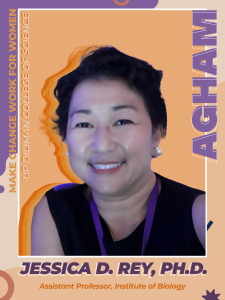Women in STEM: Dr. Jessica Domingo Rey
 Beginning her fruitful scientific journey at the International Rice Research Institute (IRRI), Dr. Jessica D. Rey boasts of more than two decades’ experience as a rice researcher/scientist. Although she is now expanding her research endeavors to other plant species with medicinal value or high value crops such as lettuce, strawberry, tomato and pepper, she is grateful to her stepping stone for giving her a hopeful perspective in food security and research for humanitarian purposes which she carries with her as she continues her research.
Beginning her fruitful scientific journey at the International Rice Research Institute (IRRI), Dr. Jessica D. Rey boasts of more than two decades’ experience as a rice researcher/scientist. Although she is now expanding her research endeavors to other plant species with medicinal value or high value crops such as lettuce, strawberry, tomato and pepper, she is grateful to her stepping stone for giving her a hopeful perspective in food security and research for humanitarian purposes which she carries with her as she continues her research.
Dr. Rey, commonly referred to as “Dr. J” by her colleagues and students, is a geneticist, molecular biologist and currently an assistant professor at the Institute of Biology, UP Diliman where she leads its Plant Molecular Phylogenetics Laboratory. She teaches courses on genetics, plant morphoanatomy, and developmental biology.
After completing her bachelor’s degree in biology at UP Los Banos, Dr. Rey taught science in the UP Rural High School for a year. She then pursued her master’s in genetics under a scholarship from the Department of Science and Technology and got the chance to do her MSc thesis in IRRI. During this period, she became aware of three things: (a) the global food security systems and situation, (b) that her passion is research, and (c) that she wanted to continue research as service to the country and the world. It was also through this opportunity that she developed and honed her abilities in bench science, and writing and presenting her research, which she considers as important factors in becoming a scientist.
Dr. Rey took her doctorate degree in genetics also in UPLB while still working at the IRRI. And as one would expect, she continued working at the world’s premier research organization after earning her PhD. She climbed from being a student researcher toward becoming one of their head scientists and project leaders.
As a petite female scientist in the 90s who took the chance to explore the previously male-dominated field, Dr. Rey’s mantra was, ‘stand your ground and assert what you can contribute and what you know.’ “Listening to a woman, especially from a molecular biology perspective, was difficult during that time,” she says. Despite setbacks she experienced as a woman in science, she worked hard to earn the respect of higher level scientists until she was noticed and seen as somebody who would bring something to the table.
Much like any other women, motherhood also became a challenge for a budding scientist like Dr. Rey. When she started a family, she wanted to be hands-on and be present as much as possible, but her work demands her to be active in field research. “I would miss out on activities in school and would really feel bad about it. It was hard, but I needed to sacrifice a bit of my motherhood for my career,” shares Dr. Rey. It was often hard to weigh these priorities but she was lucky to be in an understanding work environment where her role as a parent was given importance. Having successfully built her career and raised her family, she can’t help but hope for better treatment to fellow working mothers who may not have the privilege that she had. She lobbies for a supportive and enabling working environment for parents, especially mothers, who may feel that they have to give up on advancing their careers in order to build their families.
“I am almost satisfied with my career but I think I could influence more and do better,” Dr. Rey says. This is why apart from being a Biology teacher, mentor and scientist seeking national development through research, she also wants to campaign for accessible education for orphans, less fortunate children, victims of abuse and drug-dependent parents, and other vulnerable children. She hopes that education and other opportunities for them would become a government initiative because this is a way to lower the illiteracy rate of the country.
Additionally, Dr. Rey advocates for women leaders. Our country is evidently dominated by men in higher positions in the government so this election season, she hopes that people consider females, this time, to assume government leadership. “I have read and known many women who have the capability to lead some of our government agencies like DOST, DA, DENR, and DOH. I hope that in this coming election, we vote for new public servants who will reiterate that women can lead too.”
Dr. Rey and her co-proponents recently celebrated the success of the Smart Plant Production In Controlled Environment (SPICE), a project funded by DOST-PCIEERD aiming to establish a smart indoor farm for food production.
Dr. Rey is a licensed Agriculturist, a lifetime member of the Asia Rice Foundation and the Crop Science Society of the Philippines Inc, and an active member of the Society for the Advancement of Breeding Research for Asia and Oceania, and the Philippine Association of Agriculturists Inc.
Know more about Dr. Jessica D. Rey here:
https://biology.science.upd.edu.ph/index.php/faculty-profile-rey/
#BreakTheBias
#womeninSTEM
#WomenCanLeadToo
